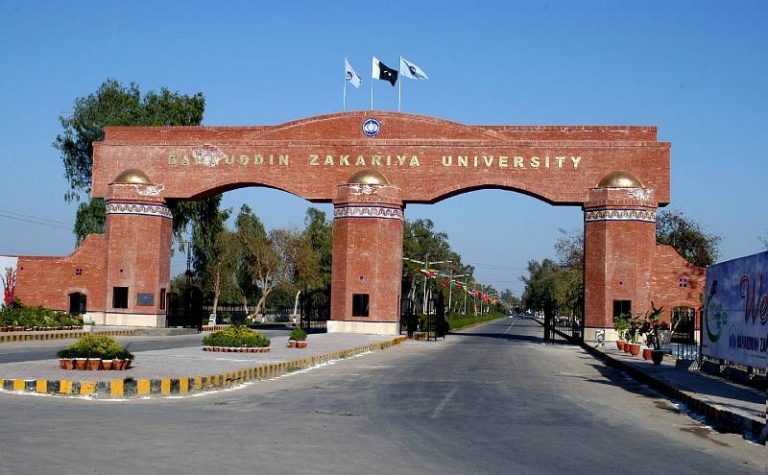Introduction to Bahauddin Zakariya University
Bahauddin Zakariya University (BZU), located in Multan, Pakistan, is a renowned public university that plays a pivotal role in higher education and research in the southern region of Punjab. Established in 1975 as Multan University, it was renamed in 1979 in honor of the revered Sufi saint Baha-ud-din Zakariya.
Historical Background and Growth
Founding and Early Years
BZU began its journey in 1975 in rented facilities with eight departments. Over the years, it has evolved into a sprawling campus encompassing sixty departments and several constituent colleges, including the prestigious University Gilani Law College and Multan College of Arts.
Expansion and Development
The university’s growth included the establishment of faculties such as Veterinary, Agricultural Sciences and Technology (FAST), Engineering and Technology, and the introduction of various academic programs to cater to diverse fields including arts, sciences, commerce, and engineering.
Academic Offerings and Recognition
Diverse Academic Programs
BZU offers a wide array of over 60 majors and minors across disciplines such as Biochemistry, Pharmacy, Humanities, Business Administration, IT, Agriculture, and Oriental Languages & Literature. This comprehensive range of programs caters to the educational needs of a diverse student body.
Accreditation and Affiliation
All degrees awarded by BZU are recognized by the Higher Education Commission of Pakistan (HEC). Engineering degrees are accredited by the Pakistan Engineering Council, while pharmacy degrees hold accreditation from the Pakistan Pharmacy Council, ensuring the quality and credibility of education.
Infrastructure and Campus Facilities
Campus Location and Size
Situated 10 km from Multan’s city center, BZU’s main campus spans an expansive 960 acres. Its strategic location and vast grounds provide an ideal environment for academic pursuits and research activities.
Residential and Sub-Campuses
The university serves as an examining body and affiliation center for 79 colleges across Multan and Dera Ghazi Khan divisions. Additionally, it operates sub-campuses in Sahiwal, Layyah, and Dera Ghazi Khan, extending its educational reach to more remote areas.
Academic Departments and Faculties
Faculty of Arts and Social Sciences
- School of Economics
- Department of Education
- Institute of Social Sciences
- Department of History
- Department of Gender Studies
- Department of Pakistan Studies
- Department of Geography
- Department of Political Science
- Department of International Relations
- Department of Communication Studies
- Department of Sociology
- Department of Applied Psychology
- Department of Philosophy
- Department of Sports Sciences
- Multan College of Arts
Faculty of Science
- Institute of Chemical Sciences
- Centre for Advanced Studies in Pure and Applied Mathematics
- Department of Computer Science
- Department of Information Technology
- Department of Telecommunication Systems
- Department of Physics
- Department of Statistics
- Institute of Pure and Applied Biology
- Institute of Molecular Biology and Biotechnology
- Department of Biochemistry
- Department of Environmental Sciences
Faculty of Islamic Studies and Languages
- Department of Arabic
- Department of English
- Department of Islamic Studies
- Islamic Research Centre (IRC)
- Department of Urdu
- Saraiki Area Study Centre (SASC)
- Seerat Chair
Faculty of Commerce, Law and Business Administration
- Institute of Management Sciences (IMS)
- Alfalah Institute of Banking and Finance (AIBF)
- Department of Commerce
- Gillani Law College
Faculty of Pharmacy
- Department of Pharmacy
Faculty of Veterinary Sciences
- Department of Pathobiology
- Department of Biosciences
- Department of Clinical Sciences
- Department of Livestock and Poultry Productions
Faculty of Engineering and Technology
- University College of Engineering and Technology
- Department of Civil Engineering
- Department of Electrical Engineering
- Department of Mechanical Engineering
- Department of Building and Architectural Engineering
- Department of Computer Engineering
- Bahauddin Zakariya University College of Textile Engineering
- Institute of Advanced Materials
Faculty of Agricultural Sciences and Technology (FAST)
- Department of Soil Science
- Department of Agronomy
- Department of Entomology
- Department of Plant Breeding and Genetics
- Department of Plant Pathology
- Department of Horticulture
- Department of Forestry and Range Management
- Institute of Food Science and Nutrition
- Department of Agri. Business and Marketing
- Department of Agricultural Engineering
Sub-Campuses and Outreach
BZU’s commitment to education extends beyond its main campus with sub-campuses in Vehari, Lodhran, and others, aimed at enhancing educational accessibility and quality in remote areas.
Academic Excellence and Rankings
Global and Regional Recognition
Bahauddin Zakariya University has garnered recognition on the global stage, ranking within the top 1200 universities worldwide according to the Times Higher Education (THE) Ranking System. It also holds a notable position in regional rankings, further solidifying its academic stature.
National Accolades
Locally, BZU has been ranked 8th nationally in the General Universities Category by the Higher Education Commission of Pakistan (HEC), underscoring its contribution to higher education and research in the country.
Campus Life and Facilities
Student Accommodation
BZU provides well-equipped hostels for both male and female students, fostering a conducive environment for learning and personal growth.
Notable Alumni
Contributions and Achievements
Bahauddin Zakariya University boasts a distinguished alumni network that includes individuals who have excelled in fields such as human rights activism, literature, journalism, politics, and academia, reflecting the university’s impact on society and its role in producing future leaders.


